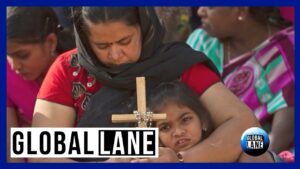PTSD and Christian “Community”
There are many people who believe that PTSD is healed in the community. It sounds good, preaches good, and even makes for good books but is it biblical, and is …
The post PTSD and Christian “Community” appeared first on Open Heaven.
There are many people who believe that PTSD is healed in the community. It sounds good, preaches good, and even makes for good books but is it biblical, and is it ethical?
People who have PTSD or Post Traumatic Stress Disorder have had a traumatic experience or a series of them that has left them in a state of fear for 12 months or more after the event. If someone can’t face a place, a person or a thing a year later, it is possible that PTSD has developed. Studies show that if a person does not “bounce back” within a year, it will be a lifetime.
Most people who find relief from trauma either find it through prolonged professional help or through spiritual means, normally prayer and impartation. In my own life, it has been the raw power of God that touched my life in the middle of the wood that caused everything to normalize.
However, there is a teaching out there that healing from trauma comes from in the context of community. Some go as far to say that healing must come from it. I believe this is partly because of “fan boys” of the community emphasis and the need for human understand of the anointing.

What is community?
The first question that we must answer is what is community? Is it a biblical thing or something that we add later to explain something that we observe like the Trinity and revival? The truth is the community was not even a word until the 1300’s and used first by the Catholic Church. It was said to be a group of people of mutual feelings or in Medieval times, it was a division of society. People in a given location was divided by many group of common interests. The same is true today, a city does not a community but thousands of little communities around common desires.
The Church is designed to not have a community but to be a marketplace for communities to develop. Men that connect over a meal on Saturdays at Hardee’s is a community. There may be a community come together about sewing among retired grandmas. Both of these may be through the church’s marketplace but they are just two communities of what can be hundreds. This is important to understand when trying to understand what is and is not community.
In most cases, it begins organically. It starts with three guys at a coffee shop and they realize they have a common interest in prayer. They start to meet a few times a month to pray together and talk about what the Lord is doing in their lives. It begins and continues based on the leading of the Spirit and they grow in faith and grace through their unplanned gatherings. This is the apostolic witness of fellowship.
Biblically, it is the language of intimacy. While most community discussion in the churches is more about being nice to each other than being intimate so it falls short of the biblical standard for fellowship.

PTSD and Community
The question remains is how does someone that has PTSD develop community and is there healing within it.
Someone who has traumatized often have major trust issues with people. Being forced into a community of like believers does not go well for them. They feel they are unsafe. We have this idea that people who have PTSD must be engaged in some form of a group and it actually backfires. It must be started by the person’s desire to engage solely.
In most cases, people who severe experience can never trust people enough to have engage in any form of meaningful relationship due to the belief they will be betrayed. At the most, they will be friendly just to make people happy that are part of the “community.”
Relationship with people who have been traumatized is on their terms. Often, they are accepting of not having much of any relationship and being isolated for their own safety. This might be uneasy for people within our churches to understand but that does not change the reality for the person was wounded by a family member, saw a murder, been to war, or raped.
In my experience, relational commitments within communities of a congregation are not a wise investment. They are not based on intimacy but being nice to people for an hour a few times a month. People who have bee traumatized are not interested in becoming a community’s “project” which is sadly what happens in many church groups.

So does community heal PTSD?
Despite what some books tell you, the answer is no. This is for several fundamental reasons. One of them it makes humanism into theology. It means we heal the broken heart and it is not Jesus. The truth is that Jesus is the healer and therefore, we are not. Community is what we do, not what God does. Therefore the healing is in the anointing alone.
The problem with these humanistic teaching in churches that do not understand PTSD or community is that they are aimed at the ideal, not the real case that people face. When people do not fit into that ideal, they are turned into being forced in some relational group of people they do not trust. As a result, nothing intimate develops and the community because a platform for more pain, not healing.
Some time ago, a man tried to get me into his home group to the point that he gave me a prophecy about it. It did not work and he was upset because I did not trust him or what to have anything to do with his group. It was not a group that I wanted to engage within and without question, share of brokenness. I choose not to engage and it became a major area of tension between this man and myself.
In short, what we call community can be part of a healing process that God uses but there is no case whatsoever for community itself being the healer as Jesus is the answer, not people.
The post PTSD and Christian “Community” appeared first on Open Heaven.



